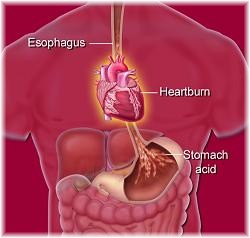|
What Is HeartburnSo, what is heartburn? Do you ever feel a bad burning sensation around the chest area after you finish your favorite meal? Does this feeling last from a few minutes up to several hours? Do you find yourself waking up through the night experiencing a chronic cough, or have a sour taste in your mouth? Well, these are symptoms commonly known as heartburn. 
During digestion, there are certain foods and liquids that relaxes the
Normally, the LES is supposed to protect the esophagus from these digestive juices. The LES is a one way valve that protects the esophagus by closing as soon as food and liquids are swallowed and reaches the stomach. But, sometimes the LES can become weak and is not able to close properly. Sometimes our eyes can grow larger than our stomachs. When this happens, we get the urge to fill our plates with an enormous amount of food. After we finish eating, our stomachs gets just a bit overwhelmed by all of the pressure on the stomach from the food we've eaten. The end result is the lower esophageal sphincter will become relaxed, (or slightly opened) and stomach acid is forced back into the esophagus. Most people experience this uncomfortable feeling from time to time. In fact, studies reveal that about 50 million Americans experience heartburn at least two or more days a week. If you experience this discomfort more than two or more days a week, even after you've tried different over-the-counter (OTC) remedies and home treatments, then you could have a more serious condition known as acid reflux.
Are you able to recognize the difference between what is heartburn and what is a heart attack? Because of the severe pains around the chest area, people sometimes get heartburn confused with a heart attack. Some people may confuse a heart attack with just a bad case of heartburn. In reality, heartburn doesn't affect the heart in any way. Here a few simple ways to recognize if it's heartburn:
Here a few simple ways to recognize if it's a heart attack:
Please, if you think you are having a heart attack, or if you're not sure of what is heartburn, it is very important that you visit the emergency room immediately.
|




